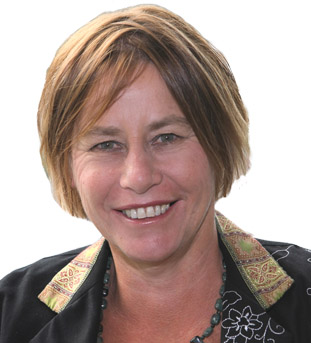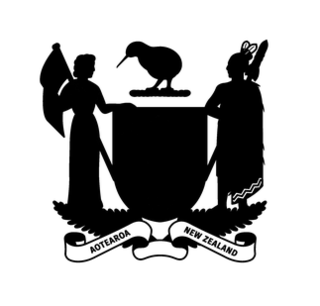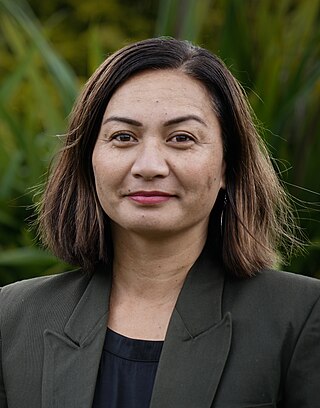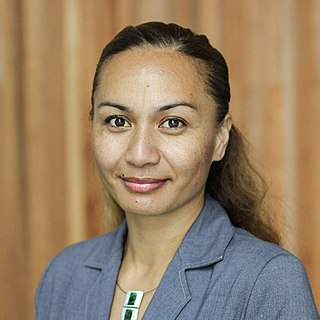The Green Party of Aotearoa New Zealand, commonly known as Green or the Greens, is a green political party in New Zealand. Like many green parties around the world, it has four pillars. The party's ideology combines environmentalism with social democratic economic policies, including well-funded and locally controlled public services within the confines of a steady-state economy. Internationally, it is affiliated with the Global Greens.

Jeanette Mary Fitzsimons was a New Zealand politician and environmentalist. She was the co-leader of the Green Party of Aotearoa New Zealand from 1995 to 2009, and was a Member of Parliament from 1996 to 2010.

Metiria Leanne Agnes Stanton Turei is a New Zealand academic and former politician. She was a Member of Parliament from 2002 to 2017 and the female co-leader of the Green Party of Aotearoa New Zealand from 2009 to 2017. Turei resigned from the co-leader position on 9 August 2017 amid a political controversy arising from her admission to lying to the Ministry of Social Development to receive higher payments when she was on the Domestic Purposes Benefit and later, to being enrolled to vote in an electorate where she was not eligible when she was 23.

Aotearoa Legalise Cannabis Party (ALCP), also known as the Cannabis Party, is a political party in New Zealand. It is dedicated to the legalisation of cannabis for medical, recreational and industrial use. It was founded in 1996 and has stood in every general election since, but has never won representation in Parliament. Several of its members have gone on to political success after leaving the party.

Sue Bradford is a New Zealand activist, academic, and former New Zealand politician who served as a list Member of Parliament representing the Green Party from 1999 to 2009.
Deborah Leslie Coddington is a New Zealand journalist and former ACT New Zealand politician.

Susan Jane Kedgley is a New Zealand politician, food campaigner and author. Before entering politics Kedgley worked for the United Nations in New York for 8 years and for a decade as a television reporter, director and producer in New Zealand.
Richard James Gerard is a former New Zealand politician. He was a National Party Member of Parliament from 1984 to 1997.

Margaret Elizabeth Austin is a former New Zealand politician. She was an MP from 1984 to 1996, representing first the Labour Party and then briefly United New Zealand.

Elizabeth Patricia Tennet is a former New Zealand politician.

New Zealand Republic Inc. is an organisation formed in 1994 whose object is to support the creation of a New Zealand republic.

Republicanism in New Zealand is the political position that New Zealand's system of government should be changed from a constitutional monarchy to a republic.

Kennedy Gollan Montrose Graham is a New Zealand politician and former Member of Parliament for the Green Party. He has served in the New Zealand Foreign Service for sixteen years, and lectured at the University of Canterbury and Victoria University of Wellington.

David James Clendon is a New Zealand former politician. He was a list Member of Parliament in the New Zealand House of Representatives for the Green Party of Aotearoa New Zealand from 2009 until 2017. He later served one term on the Far North District Council from 2019 to 2022.

Celia Margaret Wade-Brown is a New Zealand politician who has been a Green Party list MP since 19 January 2024. She previously served as the 34th mayor of Wellington, the capital city of New Zealand, from 2010 until 2016.

Marama Mere-Ana Davidson is a New Zealand politician who entered the New Zealand Parliament in 2015 as a list MP representing the Green Party of Aotearoa New Zealand, of which she became the female co-leader in 2018.

The Green Party of Aotearoa New Zealand male co-leadership election, 2015 was held to determine the future leadership of the Green Party of Aotearoa New Zealand. The election was won on the first ballot by first term List MP James Shaw.

The Green Party of Aotearoa New Zealand female co-leadership election, 2018 is an election that took place between 26 March and 7 April 2018 to determine the future leadership of the Green Party of Aotearoa New Zealand.

Tory Awatere Whanau is a New Zealand politician. She was elected mayor of Wellington at the 2022 election. Previously she served as the parliamentary chief of staff for the Green Party.

The 2009 Green Party of Aotearoa New Zealand male co-leadership election was held to determine the future leadership of the Green Party of Aotearoa New Zealand. The election was won by list MP Metiria Turei.

















